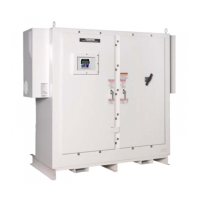HX7+ ASD Installation and Operation Manual 29
Terminal Descriptions
Note: The programmable terminal assignments may be accessed and changed from the
default settings as mapped on
pg. 59 or via the Direct Access method: Program
Direct Access
applicable parameter number. See the section titled Program
Screen Menu Navigation on pg. 59 for the applicable Direct Access parameter
numbers. For further information on terminal assignments and default setting
changes, see the sections titled
Default Setting Changes on pg. 45 and Terminal
Selection on pg. 61.
Note: See the section titled Cable/Terminal Specifications on pg. 231 for the ASD conductor
and terminal electrical specifications.
ST — The default terminal assignment is Standby mode controller. As the default setting, this terminal
must be activated for normal system operation (system is in Standby when activated). The ST terminal
is activated by connecting CC to this terminal (Sink mode). If not connected to CC, Off is displayed on
the LCD screen. This input terminal may be programmed to any of the functions that are listed in
Table 14 on page 189 (see F113).
RES — The default terminal assignment is Reset. As the default setting, this terminal resets any active
alarms or faults. The RES terminal is activated by connecting CC to this terminal (Sink mode). A
momentary connection to CC resets the ASD and any fault indications from the display. Reset is
effective when faulted only. This input terminal may be programmed to any of the functions listed in
Table 14 on page 189 (see F114). See the section titled Alarms, Trips, and Troubleshooting on pg. 195
for a listing of the faults that do not respond to a reset.
F — The default terminal assignment is Forward run. As the default setting, this terminal provides a
forward run command. The F terminal is activated by connecting CC to this terminal (Sink mode). A
connection to CC provides a forward run command for the duration of the activation. This input
terminal may be programmed to any of the functions listed in
Table 14 on page 189 (see F111).
R — The default terminal assignment is Reverse run. As the default setting, this terminal provides a
reverse run command. The R terminal is activated by connecting CC to this terminal (Sink mode). A
connection to CC provides a forward run command for the duration of the activation. This input
terminal may be programmed to any of the functions listed in
Table 14 on page 189 (see F112).
S1 — The default terminal assignment is Preset Speed 1. As the default setting, this terminal provides
a Preset Speed 1 run command. The S1 terminal is activated by connecting CC to this terminal (Sink
mode). A connection to CC provides a forward run command for the duration of the activation. The
Preset Speed 1 function is configured at
F018. This input terminal may be programmed to any of the
functions listed in Table 14 on page 189 (see F018).
S2 — The default terminal assignment is Preset Speed 2. As the default setting, this terminal provides
a Preset Speed 2 run command. The S2 terminal is activated by connecting CC to this terminal (Sink
mode). A connection to CC provides a forward run command for the duration of the activation. The
Preset Speed 2 function is configured at
F019. This input terminal may be programmed to any of the
functions listed in Table 14 on page 189 (see F019).
S3 — The default terminal assignment is Preset Speed 3. As the default setting, this terminal provides
a Preset Speed 3 run command. The S3 terminal is activated by connecting CC to this terminal (Sink
mode). A connection to CC provides a forward run command for the duration of the activation. The
Preset Speed 3 function is configured at
F020. This input terminal may be programmed to any of the
functions listed in Table 14 on page 189 (see F020).
S4 — The default terminal assignment is Emergency Off. As the default setting, this terminal provides
an off command and may apply a brake if so configured (see
F603). The S4 terminal is activated by
connecting CC to this terminal (Sink mode). A connection to CC provides an Emergency Off
command that terminates the ASD output. A Reset or restart is required to resume normal ASD

